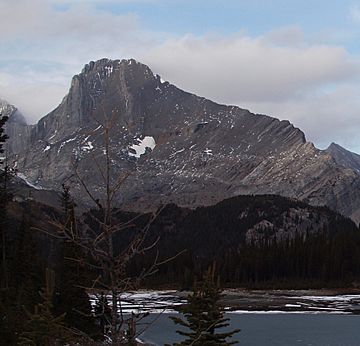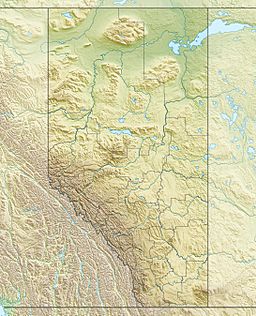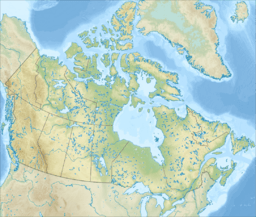Mount Jellicoe facts for kids
Quick facts for kids Mount Jellicoe |
|
|---|---|

Mount Jellicoe seen from Turbine Canyon
|
|
| Highest point | |
| Elevation | 3,075 m (10,089 ft) |
| Prominence | 179 m (587 ft) |
| Parent peak | Mount Smith-Dorrien (3151 m) |
| Listing | Mountains of Alberta |
| Geography | |
| Location | Peter Lougheed Provincial Park Alberta, Canada |
| Parent range | Spray Mountains Canadian Rockies |
| Topo map | NTS 82J/11 |
| Geology | |
| Age of rock | Cambrian |
| Type of rock | Sedimentary rock |
| Climbing | |
| First ascent | 1922 E.W. Crawford, W. Gillespie, M.D. Geddes, M.P. Hendrie, N.D.B. Hendrie |
| Easiest route | Scramble |
Mount Jellicoe is a tall mountain peak in Peter Lougheed Provincial Park, Alberta, Canada. It stands 3,075-metre (10,089-foot) high in the Canadian Rockies. Close by are other peaks like Mount Smith-Dorrien, which is a bit taller. You can also find large ice fields, called glaciers, near Mount Jellicoe.
Like many mountains in Kananaskis Country, Mount Jellicoe was named after people and ships from the 1916 Battle of Jutland. This was a very important sea battle during the First World War.
Contents
The Story Behind the Name
Mount Jellicoe was named in 1918. It honors John R. Jellicoe (1859–1935). He was an important leader in the British Royal Navy. Admiral Jellicoe commanded the British Grand Fleet during the Battle of Jutland in World War I.
First People to Climb Mount Jellicoe
The first time people successfully climbed to the top of Mount Jellicoe was in 1922. The group included E.W. Crawford, W. Gillespie, M.D. Geddes, M.P. Hendrie, and N.D.B. Hendrie.
The mountain's name became official in 1924. This was decided by the Geographical Names Board of Canada.
What Mount Jellicoe is Made Of
Mount Jellicoe is made mostly of sedimentary rock. This type of rock forms from layers of sand, mud, and tiny bits of sea creatures that build up over millions of years. These layers were laid down during ancient times, from the Precambrian to the Jurassic periods.
Later, huge forces from inside the Earth pushed these rock layers. This caused them to fold and lift up, forming the mountains we see today.
Weather and Climate
Mount Jellicoe has a subarctic climate. This means it has very cold, snowy winters. Summers are usually mild. Temperatures can drop below −20 °C (that's -4 °F), and with the wind, it can feel even colder.
The best time to climb Mount Jellicoe is from July through September. During these months, the weather is usually more favorable. Any rain or melting snow from the mountain flows into the Upper Kananaskis River.
 | John T. Biggers |
 | Thomas Blackshear |
 | Mark Bradford |
 | Beverly Buchanan |



